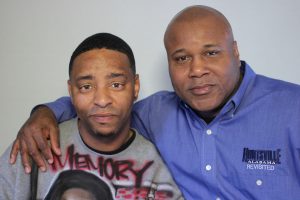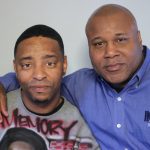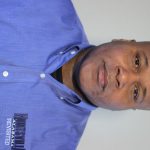Antonio Howard and William Hampton
Description
Friends, Antonio Howard (40) and William Hampton (52) have a conversation about Huntsville's historical housing projects, Councill Courts, which was the first affordable housing structure in Huntsville for African Americans.Subject Log / Time Code
Participants
- Antonio Howard
- William Hampton
Recording Locations
U.S. Space and Rocket CenterVenue / Recording Kit
Initiatives
Keywords
Subjects
People
Places
Transcript
StoryCorps uses Google Cloud Speech-to-Text and Natural Language API to provide machine-generated transcripts. Transcripts have not been checked for accuracy and may contain errors. Learn more about our FAQs through our Help Center or do not hesitate to get in touch with us if you have any questions.
00:08 My name is William Hampton. I'm 53 years old today's date is March 28th, 2014. We are in Huntsville, Alabama.
00:21 My relationship to
00:23 Antonio is friend.
00:28 My name is Antonio Howard. I'm age 40.
00:33 Today's date is March 28th, 2014 and we are here in Huntsville, Alabama and my relationship to William friend.
00:49 Antonio what's going on big brother? Hey, man, how you doing? Pretty good, and I'm excited to hear the stories that you have about cancel your quarter projects public housing public housing.
01:10 Folks offended by calling them projects and growing up. We lived in two different ones. We lived in Mason Court Apartment Homes, and we lived in Northwood. Okay, but it never offended me calling it the projects. So so what's your feeling on on that? You know, I was never offended with the with the word projects. I don't even know I was a living in the projects because it was so much.
01:38 Find out that that you don't even though we lose our projects. It didn't feel like the word projects that everybody's offended by right. Yeah, so I have no problem with it at all. I was talking with a friend who grew up in Council court, and he was telling me what we were discussing growing up here in Huntsville, right? We move so many times, but one of those times we lived in a in a house. Okay. Tell him about it. He said man you lived in the house, and I said, well you guys lived in a brick houses. That was one of the things that I always admired about the projects. They were brick, right we lived in these little shanties, but at least in the project, you know, they were so give me
02:23 Give me a little bit of what it was like growing up in Council court and then
02:28 I want to get your your
02:33 Your experience of a I know you went and did some research regarding the namesake for Council court and we'll discuss that little bit too. But give me a little bit of what it was like growing up there in the in the seventies eighties. I was I was born out there in consequat was born in 74 and we moved out in August of 1916. So why it's been my whole life out there up to that point. I think the biggest perk that we had was that everybody who we went to school with live out in the same neighborhood. So we saw him not only at school but we saw him after school. We saw him on the weekends and these were our best friends, you know, I will kind of parts. We only saw them Monday through Friday, right? And so we didn't see them on the weekends until we got older, you know, when it was driving cars and stuff, but that was the biggest perk was.
03:33 Having your day with your friends right next door the other guys who played ball with the guys you wrestle with and you know, it was it was so much fun to live out there in a few friends out there living that close. Yeah. Yeah. So that's biggest part. I remember doing that early to mid-seventies actually sixties as well. But because but during that same time. You talkin about I remember coming through there and there was some colorful characters in Council court and I remember a skeeter mosquito was a he was a character ski was always cool, but I remember him ever since I was a little a little boy. I haven't seen him in a while would love to see it. Right but he was a very nice guy. I think the most colorful character that lived out there in my opinion besides my my father who illustrate stories real well was a guy
04:33 Dentists, okay. Hey Dennis Eason. He coached basketball. He coached volleyball, but he was also
04:44 I don't use the word impersonator, but he kind of became Michael Jackson to us in the sense that he he he remade or or or copied Michael Jackson's Thriller concept and he did it. So well that they allow him to tour the city schools with this with this cast of of of of zombies that that help with, you know what with the production of it. But Dennis was he was very charismatic outspoken about you know, social issues. But the biggest thing was that he was even his Michael Jackson got and he he he did Michael Jackson and like so they let him tour pork noodle to the school system and I just thought as a kid looking at him do that and he did it. Well, he did it. So well that they nicknamed them Thriller, you know, that's how well
05:44 You did it and then. But he just sticks out like a sore thumb we made it because he coach basketball to ya-ya Growing Up in Council Court in the shadows of Huntsville Hospital. Here's this historic area that was once home to Native Americans to Slaves. Which of the Huntsville Hospital Parking Garage on the east side there a Gallatin build on slave Cemetery. Here's this this community with a historic School exactly named after Council. Who is this Council?
06:28 Wigan Council, I'll never forget asking a friend of my father's Anthony Ellison. We were at a party one day and up until this point. I started reading some books and wanting to know know bits of information. And so I knew that Mason Court was named after a senator Barkman. I believe home for rent homes. I knew new project was named after service. See who was the mayor of Bedford Court in Butler Terrace Northeast housing projects. They had these names right always want to know well who was cuz of coordinating out there and what?
07:10 Caught my eye was the spelling because I noticed that they had two L's on the end rather than one that's all so well that somebody's last name and I did my research and come and find out that it was named after William Council who is the founder of Alabama A&M university had no idea none of the adults that I grew up with when I ask them had no idea that it was named after him in but we can Council was no he was an x-ray even and he started he's pretty much the father of the Agricultural mechanic school industrial system in Alabama. If so, that's that that's that was my other one to me. And one thing I read about doctor Council. It's interesting. He's not as widely known that Booker T, Washington girl, but Booker T, Washington got a lot of his philosophies.
08:10 William Hooper councill riding around that pretty interesting actually ran across speeches that he and Booker T actually get together here in Huntsville, right and it's just amazing to know this information. That is not known to us or William Council was I but we know more about you know, Booker T & W E DuBois and all these guys. I tell you I took a trip to I'm Memphis back in 98 and I went up there for a weekend. So I decide to go to little Martin Luther King Lorraine Motel, you know, where was assassinated as change it to a museum now, so I'm walking down this wall looking at all these pictures.
08:55 Not see this picture William Council and I thought why is we can counseling at this is Foo.
09:04 My housing project where I grew up was named after this guy and at the time I only knew his name, I don't have a lot of information about them, but it just stuck out to me like while he's all the way in Memphis. He must have done something. You look great to be in this Museum. So so yeah, he was he was a great guy.
09:25 Now here you grew up in Council Court in this neighborhood the adults there didn't know who he was you attended Huntsville city schools. And now I know especially in high school. We had Alabama history. So not once are you telling me that William Hooper councill or or were they any Huntsville black noted citizens were taught what war were you taught any of those not in love in school? We have a gym a wreck or reck center right up the road where we used to play name of the Scruggs Community Center. And after I found out that Council quit was named after we counsel will that stick out like a sore thumb Scruggs and I see now that somebody's name. So I looked him up and researched him and come to find out this gym that we've been playing that part.
10:25 Black community for years is named after. Dr. Burgess e Scruggs a who was one of only two of black doctors in the state, Alabama and matter fact the first rank in the state, Alabama, you know, this is not in history books. Oh, so this, you know stuck out as well. Like wow William Council, dr. Burgess Scruggs, you know, it was just as it was a good feeling to learn that okay now,
10:56 The project is going now. Let's go. I think there is a retail land and the hotel development there now.
11:06 How do you feel that this Legacy can live on about William Council course, Alabama A&M is there road so they live there but from the the neighborhood this historic neighborhood, what are some of the things you like to see done to to help that Legacy limbs will it's definitely up to us to preserve it and then to have it her memory and I refer to her as a she is a female because look at her as a female who raised a lot of children and two adults one way that I've decided to preserve a memory was before they tore it down. I feel numb the documentary which is called Council quarter history of love it. So what I wanted to do was you know engage in conversation like you and I are doing with former residents.
12:06 How to see what their thoughts were and how they felt about the place the state that it was in at the time even now as I was able to do that to get that and so now know when I look at that video and I see these buildings that I'm no longer there, you know, it's it does something and it means a lot and it means a lot but why is it important for the council Court memory to live on this important because of who William Council was important because from my understanding it was its historic in the sense that it was the first housing project to allow African-Americans in the City of Huntsville to live doing my research would we can Council Envision a place for African Americans live in Kansas quarters and extension of his vision, even though he had passed away before it was built.
13:06 Even children know my children. I want them to be able to say to be able to go back to the archives in NC. Hey, this is where my dad live. This is where my grandmother lived. This is where my great-grandmother's do, you know my uncle lives over here. And so that place is surrounded pretty much historic Hospital in a sense the Medical District. You got five points up the road. Yeah, it's Dark Horse full up the road and come score. This is part of that and you know, I my eyes so I wanted to preserve it because I feel it's necessary to history of some people who what who who out who were dear to me and who I looked up to, you know, as a kid who was very influential the former Council High School via. Can you tell me any
14:00 Experience there does did you attend school there actually went there when it was a when I wanted was a preschool. They closed down in 66 do the integration and I went there when they made it into a daycare one of the members that I have two members. I share. I think it was every Thursday or Friday. They brought in McDonald's hamburgers and we ate McDonald number but this is my first time eating McDonald's and then I have a friend by the name of Kim Jones until this day. I can remember her reciting her days of the week and she would always say Sunday Monday Tuesday Wednesday, Thursday, Friday Saturday and every time she was a Saturday she would get excited. And so I have this memory in my head of going to that going to that school going to the daycare now I read where they had a
14:52 A pretty good football team. One of the one of the teams went undefeated your survey answer. Give me a little on the last remaining that last year cancel high. They had a team that went.
15:08 12 + oh, I believe and they averaged 25 points a difference as far as big big beat. They beat teams by 25 points a year. My uncle's doing my uncle's place on that team GM and your Bellman and it was the it was the last undefeated season that counts are high are they went on to play which at that time they weren't allowed to play a CD schools around cuz it was segregation of what they did Lobby for a chance to play Huntsville High which was speedometer white which is all white and I think they were like 10 and one and he do not count size 12 and old will the CD awarded these to the championship Thomas. Why is all the student body got together and wanted to play these guys have to get a chance to see who's the real City Champs and of course it never happened never happened never happen, but it was
16:08 That's that's cool that coach Adam Cullum. He was the first football coach in the last football coach. He's been there that long so they never saw another football coach buddy. I'm he was there from the first time they had a football team all the way up till to the last visionist community of seems like there was a lot of love and usually, you know project you hear a crime stories and got some clothes to put who was some of the the pillars of the community you could help hold it together and if I forget any names, I don't mean to but just right off hand, you know, I can name, you know that takes the number one, you know Fred Tate April tape Tanya Tate Linda Tavon.
17:08 Call Jeanette JC, you know are they it was it was one just one big family. Will they lived you don't own one end of the project at the end of the street? Okay in the back and you had the laceys you have you have the douglases with Elaine and in him and and Reverend Douglas of the project or if he had the project, but it's so many people you have towards a bobbin in Willy. You have the cash is a Columbus and Milton and Miss cash of the Jennings so many families. You know, who the Rice's who were there. No doing that time and it can recall the same stories, you know that I can and these people were influential. They all took care of all the
18:08 Plus, you know if we got in trouble if we got in trouble hanging with you know, the Jennings we were going to get a spanking by Mary and sent home to Mama and get another spanking but the love is kind of indescribable is almost you would have to experience it. But we never really had any major problems out there with each other. You know, that's the one thing I can say your we had you no fights, but the next day makes our everybody's back playing together. Yeah. Yeah. Yeah if I answer that question correctly so many people out there so many
18:48 When did you get word that the project was in danger of being torn down? Cuz I know before they actually did it look years and years and years and we would hear it in the newsletter as a resident. What were you feeling?
19:08 As a resident when I first heard it when I first heard.
19:14 What a light bulb went off. There's a movie out you singing it Boyz in the Hood John Singleton Ice Cube Laurence Fishburne and Cuba Gooding jr. There's a scene where Morris Chestnut and Cuba Gooding jr. Are in Lawrence's office.
19:33 And so more sad, what do you do for a living?
19:37 And Lawrence just looked up and said come on. Let me show you so they get in the car to take this drive to this neighborhood and behind them. They get out is right in the smack middle of the hood and they get out and they stand in front of this billboard and Lauren Sachs and I'm going to say is do you know what that billboard says and then turn around and shows what it says homes for cash.
20:01 And they repeated what it said homes for gas. And Lauren said no. Do you know what it means? And he explained that the word gentrification that was my first time in that were and what it meant that when the property value goes down. Then the poor up pretty much moved out. The land is sold at a profit and then they come in and build up. And so I first heard about that in like 90 right before I moved out 9091. How did it make me feel? I was such a I was such a young kid at I was only 16 17 years old, but it did make me think and I thought well it'll never happen but as the years went by and I saw how the housing project started to go down. A lot of people may look and say that it was already down as housing project, but I actually saw the change know the trees got cut or nobody was planting flowers outside.
21:01 All the children have moved out empty houses. It made me feel a certain type of way because I knew that we were
21:11 We were not that project that the perception of the board project has we would we were different.
21:20 Different in what way
21:23 Just the closeness that we had. Like I said, I think where we were located approximately where we were located where people who we went to school with.
21:38 It was like you had to be.
21:43 Up there, you know what? I mean Blossom wood Huntsville middle of it, you know, their parents were lawyers and doctors perience of coming from won't say poverty. Yeah to to have a neighborhood in the Medical District doctors and lawyers kids and Engineers kids that had to go to work the restaurant but
22:11 To to go to a school or two schools in that that district with with such a gap in the
22:22 Economic make up for what was that? Like never made us feel like it was a gap though. Like my friends whose parents were these engineers in and doctors and lawyers. They never made us feel that Gap. They never made us feel that guy land in till this day. You know, we're still friends till this day and we've been friends since we were in first grade most of these guys and girls but their parents, you know, if if you know, we wanted to spend the night we can spend tonight, you know, if I have to gain a bob got taken out to the Burger King with Bob's dad was going to take all of us out to Burger King, you know, but we never we never I never felt
23:11 Big gap because like I said, it is the truth of it is we were living in poverty, but I never felt like we were living in poverty a few times. I wanted some things that Mom couldn't put it in that, you know, but the whole sense of of it being low-income never felt it and you mentioned earlier of a video project in CD projekt, so
23:41 Show me a little about that. Are you archiving history through this or they just a music CD to get radio play or what? What's your your amen objective for music that you releasing my aim and objective is to preserve memories through a medium known as entertainment.
24:08 Musically, I wanted the songs to be.
24:13 Her 20 years from now and people can say wow. I remember Council court or I remember that song there was a guy who I let you had a couple of songs, and I didn't think it was going to call me back cuz he lives in Decatur.
24:32 Never heard anything back on support and he called me sit means you got me feeling like I'm from Council court and I've never been to cancel court and that's what I wanted to do. I wanted to Archive a story. I wanted to Archive a people. I wanted to preserve a legacy in the name of we can counseling those who lived out there. So that's my whole purpose is Radio play does coming in this fine, but my aim was to just when I'm 60 years old, and I'm sitting in my rocking chair with my grandchildren. I want to be able to
25:12 Sit down with them and listen to what I was saying. I should have said that when I was 40 and that's that's not what Grandpa wants to be remembered for. It is also a blueprint, you know to tell them that if they do, you know choose to do hip hop hip hop is such a big thing is not going anywhere when it first came out. They said they would only give it thirty years that it's going on 40. + so I don't think they can escape it because it has so much influence with with with the world that I wanted to just give them a blueprint to say, okay if you're going to do it
25:53 Tried doing it this way.
25:56 You know without the cuss words without the profanity you can still keep it hood, you know, but you don't have to use those words and use it to teach. Is that what I'm hearing to teach me to use it to teach used to teach.
26:15 I have a question. Why do you think?
26:20 It's important for the younger than
26:22 About
26:28 I think it's important because you know children are impressionable number 100 children are tape recorders and then video cameras that we program and record everything and I mine history when it's not given properly lessons get lost in that and consequences of object lesson for me in the sense that can you have this guy who's a storical figure we can cancel if I'm not mistaken the first sex slave.
27:14 To start a school
27:18 Start a college.
27:21 First x-ray weather I don't think people know that that an exclave could do that. Let alone be the first to do it during those times and so for my children, I'm I'm proud of where I'm from and I want them to know this is where your dad came from and so it's important to me that cancel court is is is is remembered as a as a as a historical Community just like another Community now is that name still in existence for what happened with the area then canceled on set the project the neighborhood Council courts name is only existed in our hearts. Mike said the place is gone.
28:13 Other than that
28:17 It's is gone other than a documentary in a few videos of unless the news has footage of these buildings that's going to be the only place you ever see this community.
28:42 That was a pretty rough rough time. Cuz that moves up the residents down on the south end of town and there were few people who opposed that that move which is understandable. I think it was just kind of done under the table. Nobody had a chance to vote on it. And so with that that ruffle some feathers with with some with some with some residents on the south end of town.
29:16 But the the residence they got spread it out throughout the city the other housing projects, you know some took vouchers or to get Holmes a Section 8 homes, LOL move to another project going to go down to these better apartments and it was just a rough time for such a rough time. People didn't like it.
29:39 Remember, how you?
29:44 Yes, I felt what what what made me?
29:49 Uncomfortable was the reaction not only from the south end, which I understood.
30:00 But the reaction that I wasn't hearing from my own people.
30:05 And the paper was flooded with comments from hey, we don't want them down here and and it's going to be a bunch of trouble understand that but there was no reaction from the Residence Inn Council court that I recall of them saying, hey, we're not like that. You're not getting those people and that's what made me uncomfortable. That's what I didn't like was of keeping silent in nobody not saying anything to do to say that we're not going to be like you think we're going to be
30:42 What about have you heard about or talk to some of the residents that once lived there and how their lives are now. Yeah, we actually talk quite often.
30:54 We talked about canceled all the time. They miss it just as much but we also have accepted that changes is something that we can avoid. And so we have embraced it. We didn't put up a big fight with city council. We didn't go get the cameras and run downtown is it? Hey y'all are not taking our home. We accepted to change even though we didn't like it. So but but but these people are the swimmer residence of they still hold Council Court dear to their hearts and they miss you just as much but but they have moved on they have moved on with their lives.
31:38 And my last question is how do you want Council chords to be remembered in history? I want classical to be remembered as a community that people love and really
31:53 Care for the namesake is very important because a lot of people don't know who William Council who William Council was my purpose I feel for this community was to be a voice and to say hey, we are not just another housing project that you guys are just going to tear down and move us out when you do turns down and moves out with still going cuz of Courts name is still going to be here. It's still going to be a part of your history the other a lot of housing projects that get torn down and in the name is going, you know, nothing to that.
32:42 So I wanted to leave something. I wanted to have something left for us for them to everybody and so that's why I went to the length of recording the documentary a recording the album you mention the community center Scruggs who happened to also be one of huntsville's first black aldermen banking 1800, but I remembered great powers powers who was named after another Alabama A&M president to all of that with the exception of the school in the community center, Everything is going to doctor JF Drake who was
33:24 He was friends with the author of roots Alex Haley. Alex. Haley was a kid. He was friends with his dad Alex Haley lived here and hunt. And so even you know, JF Drake Dr. JF Drake know, he's a historical person. We knew nothing of that and this stuff is right these names. He's been he's all right here and I will community and then named after these people and sold its historical historical and we were going to make it historical, you know, so and so that's what we did. That's what we did.





